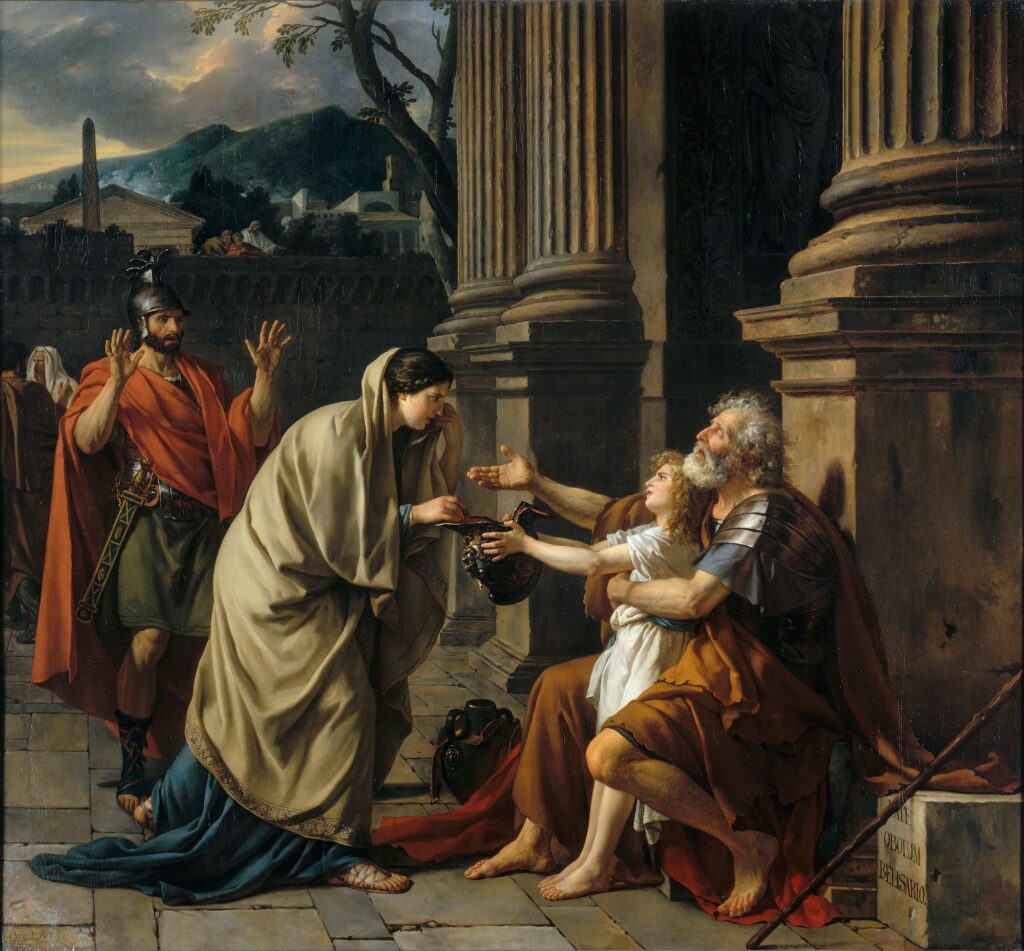Brandon Muncan
Stony Brook, New York
 |
| Jaques-Louis David. Belisarius Begging for Alms. 1781. Via Wikimedia. Public domain. |
Since Plato, the notion of a sufferer helping the suffering has been proposed as one of the more skillful ways of helping a patient through an illness.1 Although this concept has been discussed since the time of Athenian philosophy, the term “wounded healer” itself was only coined in 1951 by Carl Jung, who became convinced of the significance of this idea toward the end of his life. The wounded healer paradigm implies a physician, who, having personally suffered or undergone illness, uses this experience to provide more compassionate care to his or her patients. Wounded healers began to gain more recognition after being put into practice by Jung and featured in the narrative writings of some physician-authors. Yet criticism of full transparency on the part of physician-wounded-healer exists, and arguments both for and against doctors’ disclosure of personal illness deserve to be discussed.
One of the advantages of having a wounded healer as a physician is believed to be an improved doctor-patient relationship. If patients share a professional, yet deeply personal bond with their physicians, the outcomes have been claimed to improve. Robert Klitzman found that wounded healers have had an increased sensitivity to patient needs, better communication skills, and more genuine empathy.2 Moreover, many used their personal experiences (both bad and good) to change their clinical practice to reflect the kind of care they would have wanted as patients. Many of these wounded healers believed in teaching medical students to communicate in simpler and more understandable terms or in giving personal tips on such issues as how to remember to take medications.2
Wounded healers can also help themselves while helping their patients. Although the primary responsibility of doctors is to their patients, ill physicians, by helping others, can also help themselves. Indeed, for doctors who have the emotional, spiritual, and physical ability to use their suffering as a tool to assist others, sharing experiences or advice can be therapeutic for all involved. But as Zerubavel and Wright highlight, the trauma of the healer should be resolved or at least in part resolved so as not to overshadow the experience of the patient with the suffering of the doctor.3
The act of discussing physicians’ personal narratives with patients is not without criticism. Clearly, the patients must come first and foremost. Rightfully so, many opponents of the wounded healer idea worry that therapeutic emphasis would be placed on healing of the doctor instead of the patient.1 Some research has shown such personal healing benefit that sharing experiences would benefit the giver more than the recipient. This issue is why some authors recommend that a physician disclose only as much personal information as necessary, so as not to draw the spotlight on their own experiences.3
Another important issue is that of stigma. Some patients may have paradoxical reactions to their physicians’ problems.3 Some patients, after a doctor reveals a history of stigmatizing illness, may feel afraid or distrustful of their doctor—a clear disruption of the relationship. Therefore, narratives regarding heavily stigmatized diseases should be told very carefully, if at all.
Overall, the use of a doctor’s personal illness narratives as a strategy for developing stronger therapeutic alliance with patients is likely more art than science. It takes courage and wisdom for physician to be vulnerable without crossing the line of professionalism. Personal disclosure can strengthen the doctor-patient relationship, but the ability to recognize when such disclosure is appropriate requires professional and empathic finesse in order to stay true to the principle of do no harm.
References
- Pagano ME, Post SG, Johnson SM. Alcoholics Anonymous-Related Helping and the Helper Therapy Principle. Alcohol Treat Q. 2010;29(1):23-34. doi:10.1080/07347324.2011.538320.
- Klitzman R. Improving education on doctor-patient relationships and communication: lessons from doctors who become patients. Acad Med. 2006;81(5):447-453. doi:10.1097/01.ACM.0000222271.52588.01.
- Zerubavel N, Wright MO. The dilemma of the wounded healer. Psychotherapy 2012;49(4):482-491. doi:10.1037/a0027824.
BRANDON MUNCAN is a third-year medical student and second year master’s student in bioethics at Stony Brook University. He is interested academically in how stigma affects healthcare delivery to vulnerable populations and how psychosocial factors affect cardiovascular disease. He aspires to a career in academic anesthesia and teaching compassionate care to medical students and residents in that capacity.
Submitted for the 2022–23 Medical Student Essay Contest
Winter 2023 | Sections | Doctors, Patients, & Diseases

Leave a Reply